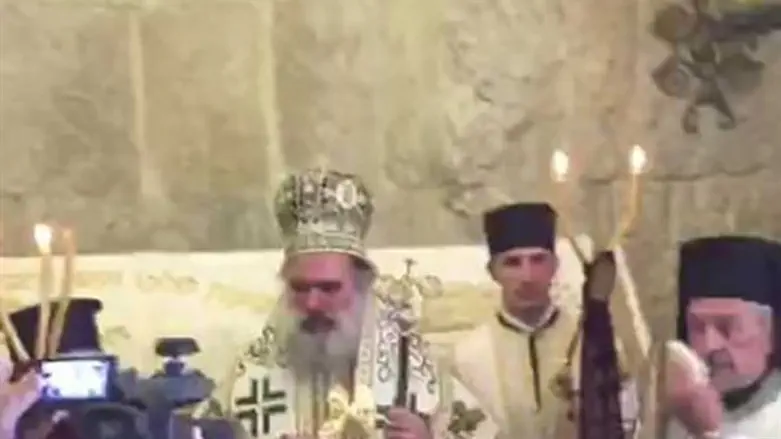
The legal battle between Greek Orthodox Church on Mount Zion and the Jerusalem Municipality continues to heat up, as the Church's response to the court following a petition filed against it includes a threatening tone towards the State of Israel if it is not allowed to build a church in the tomb of the kings on Mount Zion.
In an interview with Arutz Sheva, Boaz Cohen tells of the ongoing confrontation with the Church, a conflict that began, as mentioned, with Cohen's demand to remove a large iron barrier that the church set up to the tomb of the kings on Mount Zion. The court instructed the municipality to enforce the removal of the iron barrier preventing tourists from passing through. The court also determining that the tomb is an open public area and should be left as such.
Despite the instructions, the municipality reached an arrangement with the church, according to which the iron barrier would remain in place, but in the center of it would be a gap of sixty centimeters wide that would open and close according to the changing need.
Cohen refused to accept the new arrangement and appealed to the court to again to demand that the entire checkpoint be removed, in accordance with previous instructions from the court. However, the Church's response to the court was confrontational and revealed disturbing things, Cohen said.
"I received a letter in which there are some things that are not normal," he says. "We are in a situation where we lost Mount Zion. It turns out that they were allowed to build a church on the graves of the kings."
"They say that the area is registered in the name of the church and even if they open the gate they will not let the Jews enter," he said. "Even if we assume that the gate will be removed, the area will remain a private area in the exclusive use of the Patriarchate, a private area that, although defined as an open public space, the public is not allowed to enter." In this context, the Church would allow Jews to enter on the holidays of Lag B'Omen and Shavuot, but "only with the permission and in coordination with the Patriarchate."
The most problematic clause is the clause from which comes the aforementioned threatening tone against the city and the state. The Church's attorneys stated that the goal of the appellants is "to bring about their taking control of the land...since the land ordinances' rules apply...while the city and/or state saw no way to make use of those aforementioned regulations (Harm to property rights and holy places, something which would directly hurt the interests of the city and/or state)..."
Cohen immediately linked the expression "mega-interests" used by the church to the expression "mega-attack." He believes that church officials hint at the church's ownership of the Knesset lands, government offices, the President's Residence, central areas throughout Jerusalem and even outside it. These territories are leased to the state by the Church for a period of 99 years, and in his estimation when the Church sends threatening hints that if it's hold on Mount Zion is lost, 'mega' Israeli interests will be harmed, hinting at the day when the state will lease these lands for an additional period.
"They are not ashamed to write this to the court, to the municipality and to me. They know that there is no answer and there will be no answer, Cohen said.
Cohen feels that the Jerusalem municipality and the state are folding in the face of the Church's pressure.
"People should press the city council to sit down and confiscate the church, and if that does not happen, it means approval for the establishment of the church on Mount Zion," Cohen says. "I think they want to help," he says, referring to senior municipal officials who did not respond, "but their fear of the church is greater than the law."
The church, which the Greek Patriarchate is planning to build on the site, explains that this is a structure planned to be built above the underground structure, which is defined as the "Tomb of the Kings." According to Cohen, the source of the problem is that the definition of the Church as a holy site has gone without a Jewish response.
The underground site, Cohen said, is open only to Christian visitors, and even then only twice a year, on two Christian holidays, and for the rest of the year it is closed. "It's a public place, how can you close it and keep the keys in their hands?" he asked, noting that the site is listed in the public records as a public site.
The Jerusalem Municipality said in response to Cohen's claims that "these allegations do not correspond to the facts at all, and the proof is that all the legal proceedings taken by Mr. Boaz Cohen against the municipality were rejected time after time." It should be noted that in this response there is no mention of claims that the municipality is under threat from the Greek Church.
Arutz Sheva sought a clarification to this question, but for the moment no response has been received. If such a response is received, it will be published in full. Cohen, for his part, stated that his arguments were not rejected in court, but he has determined that he must transfer them through another procedural proceeding before they will be heard in court.